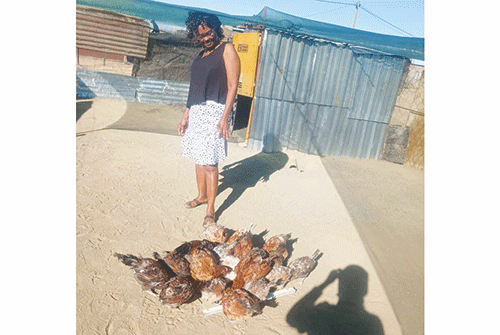TSES – As the famous adage goes, “Fall down seven times, stand up eight.”
This best encapsulates the story of Alinda Apollus (48), a resident of Tses village in the south, who, despite being forced to the ground by various vicious setbacks, rose every time and faced the world’s challenges head-on.
“I started in 2019 with 250 lay hens, 100 chickens meant for slaughter, 17 horses, and a small number of small livestock and cattle,” Apollus told New Era.
She continued that, unfortunately, her brooder structure was destroyed by strong winds, which marked the start of her trials and tribulations.
The entrepreneur continued that this forced her to construct a smaller structure, cramping all the chicks together.
As fate would have it, some of them got sick, passing the virus on to the rest of the group, resulting in most of them dying, she reminisces.
“Worsening my dire situation, I lost most animals due to stock theft and lack of grazing pasture,” she added.
Not being discouraged, Apollus approached the Berseba constituency office for assistance to get back on her feet.
“I submitted the needed quotations for the purchase of materials to build a proper structure to resume my poultry project, but it all just ended in vain,” she remarked.
In the face of defeat, she was more determined to find ways to survive.
“I enrolled online, and completed a certificate in junior primary education. In addition, I diversified my business to a smaller scale by selling daily household items from home,” Apollus said.
At the moment, she runs a public transport business, owning a minibus, while she also acquired lay hens and erected a new proper brooder structure.
“I also bought an incubator whereby I can produce 65 chicks at a time,” she said.
The farmer sells the chicks to the community at affordable prices.
“I also planted winter crop seeds like garlic, onions, beetroot, cabbage and potatoes, and once harvested later, I will use some for self-consumption, and sell the rest to the school hostels in the area.”
In her never-say-die attitude, Apollus approached the Hardap Inland Aquaculture Centre near Hardap Dam to venture into aquaculture.
“I requested that they come down and assist me with fingerlings and on how to put up breeding ponds, as well as train me in efforts to successfully make aquaculture a means of income,” she continued.
Apollus urged unemployed citizens in the village to think outside the box, be innovative, and turn challenges into opportunities to survive in life. – sklukowski@nepc.com.na



